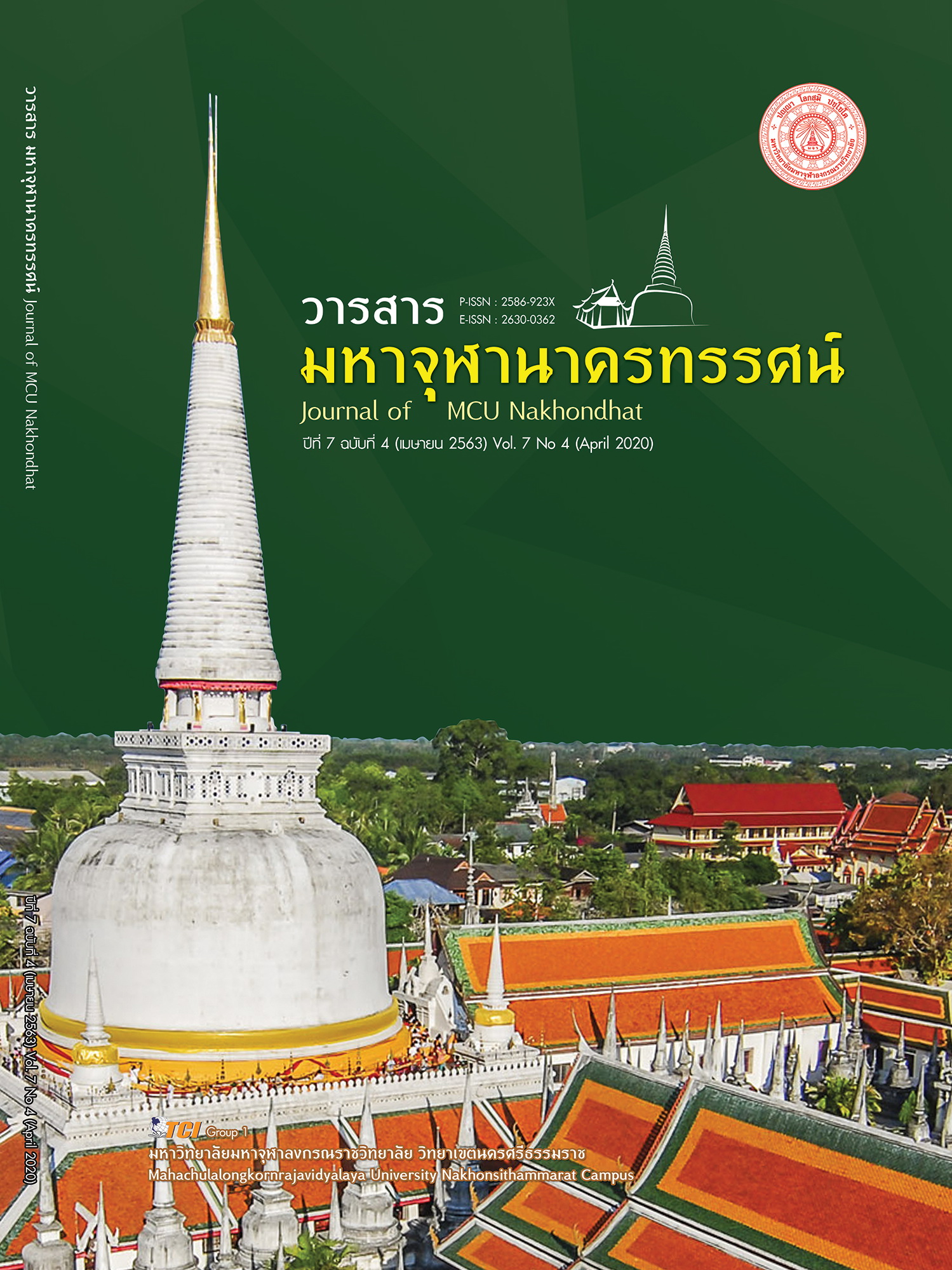ANALYTICAL REVIEW OF THE STABILITY OF THE THAI GOVERNMENT AND ISOC
Main Article Content
Abstract
This academic article aims to study state security through the ISOC, which is responsible for national security. National security is regarded as a duty of government in order to create stability harmony in the country. The strategy of national security destruction from the past to the present has changed. In the past, it emphasized the proliferation of weapons of mass destruction, or create a national trauma, which is considered a great security threat. On the other hand, whether caused by people in society or from abroad, the current destruction of national security is characterized as an attack on the economy, politics, society in order to cause confusion or fear.
Thailand has established the Internal Security Operations Command (ISOC) as an agency that is responsible for maintaining national security. The duty is divided into two parts which are prevention and suppression. In the aspect of prevention, it’s emphasizes on raising people's awareness from childhood to the elderly in the matter of nation, religion and monarchy. Regarding the suppression, there is a law authorizing the ISOC to be able to arrest the offender or anticipate the offense to be detrimental to the national security. Thailand has the ISOC on duty to maintain national security, but on the hand side the agency may be the medium of the military to negotiate the power of government with civilians.
Article Details
References
เดลินิวส์. (2562). กอ.รมน. - กสทช.เพิ่มช่องทางลงทะเบียนซิมการ์ดชายแดนใต้. เรียกใช้เมื่อ 19 ตุลาคม 2562 จาก https://www.msn.com/th-th/news/national/ar-AAGB dy1
เบนเนดิก แอลเดอร์สัน. (2559). บ้านเมืองของเราลงแดง: แง่มุมทางสังคมและวัฒนธรรมของการรัฐประหาร 6 ตุลาคม. กรุงเทพมหานคร: มติชน.
โสภณ ศิริงาม. (2562). ผลประโยชน์แห่งชาติ. NDC security review, 4(1), 1-23.
ไทยรัฐออนไลน์. (2560). กอ.รมน.จับมือ มศว รับนิสิต โครงการเพชรในตม. เรียกใช้เมื่อ 2 กันยายน 2562 จาก https://www.thairath.co.th/content/396831
กระทรวงวัฒนธรรม. (2559). 99 พระบรมราโชวาท น้อมนำราษฎร์ร่มเย็นเป็นสุขศานต์. กรุงเทพมหานคร: สำนักงานปลัดกระทรวงวัฒนธรรม.
กฤษฎา ศุภวรรธนะกุล. (2563). วรเจตน์ ภาคีรัตน์: กฎหมายกับความยุติธรรมและสิ่งที่เป็นอยู่ในสังคมไทย. เรียกใช้เมื่อ 19 กุมภาพันธ์ 2563 จาก https://prachatai.com/ journal/2020/02/86193
กอ.รมน. (2562). กองอำนวยการรักษาความมั่นคงภายในภาค. เรียกใช้เมื่อ 19 ตุลาคม 2562 จาก https://www.isoc.go.th/?page_id=545
กองอำนวยการรักษาความมั่นคงภายในราชอาณาจักร. (2560). มวลชนขยายผลเศรษฐกิจพอเพียงเพื่อการดำเนินชีวิต. เรียกใช้เมื่อ 23 กันยายน 2562 จาก https://www. isoc.go.th/?p=2858
การแก้ไขเพิ่มเติมกฎหมายว่าด้วยการรักษาความมั่นคงภายในราชอาณาจักร. (2560). ราชกิจจานุเบกษา เล่มที่ 134 ตอนพิเศษ 285 ง หน้า 13 (22 พฤศจิกายน 2560).
ครอบครัวข่าว 3. (2558). กอ.รมน.ห่วง กระแสแอนตี้ ปีเตอร์ ทำคนไม่ไปดูหนัง ละติจูดที่ 6. เรียกใช้เมื่อ 19 สิงหาคม 2562 จาก https://morning-news.bectero.com/enter tainment/2015-07-17/47521
ชนัญชิดา บุญเหาะ และน้ำผึ้ง ปัทมะลางคุล. (2561). กลวิธีการเสนอความคิดเรื่องความรักชาติในนิราศรัชสมัย พระบาทสมเด็จพระมงกุฎเกล้าเจ้าอยู่หัว. Humanities Journal, 25(2), 322-351.
ชัยอนันต์ สมุทวณิช. (2525). ยังเติร์กกับทหารประชาธิปไตย: การวิเคราะห์บทบาททหารในการเมืองไทย. กรุงเทพมหานคร: บรรณกุล.
นัชชา ตันติวิทยาพิทักษ์. (2561). กอ.รมน.มาดนิ่ม กอ.รมน.วัยทีน. เรียกใช้เมื่อ 19 กันยายน 2562 จาก https://prachatai.com/journal/2018/03/75734
พระราชบัญญัติการรักษาความมั่นคงภายในราชอาณาจักร. (2551). ราชกิจจานุเบกษา เล่ม 125 ตอนที่ 39 ก หน้า 33-44 (27 กุมภาพันธ์ 2551).
พวงทอง ภวัครพันธุ์. (2562). กิจการพลเรือนของทหารในยุคประชาธิปไตยแบบการเลือกตั้ง: พัฒนาการและ ความชอบธรรม. วารสารสังคมศาสตร์ มหาวิทยาลัยนเรศวร, 15(1), 217-247.
ภาณุวัฒน์ พันธุ์ประเสริฐ. (2556). ทหารไทยกับการพัฒนาประชาธิปไตยหลัง 14 ตุลา. วารสารรัฐศาสตร์และรัฐประศาสนศาสตร์, 4(1), 89-123.
มติชนออนไลน์. (2559). ผ้าห่มผืนสุดท้าย’ ละครเวทีที่ ‘กอ.รมน.’ ร่วมสร้าง เพื่อเข้าใจ ทหาร. เรียกใช้เมื่อ 2 ตุลาคม 2562 จาก https://www.matichon.co.th/news/ 22776
มติชนออนไลน์. (2562). กอ.รมน. เตรียมรับไม้ คสช. ดูแลความสงบ บอกใช้ พ.ร.บ.มั่นคงสานงานต่อได้. เรียกใช้เมื่อ 19 มกราคม 2563 จาก https://www.matichon.co.th/ politics/news_1544700
มวลชน กอ.รมน. (2559). การปลูกจิตสำนึกเทิดทูนชาติ ศาสน์ กษัตริย์ และคุณธรรมจริยธรรม. เรียกใช้เมื่อ 22 กันยายน 2561 จาก https://www.massisoc.com/7_image_act/ 1_web_page/2559/4_59_directory_image_act.html
รุ่งโรจน์ ณ นคร. (2539). จอมพลสฤษดิ์ ธนะรัชต์. นนทบุรี: อนุรักษ์.
สถานีโทรทัศน์สีกองทัพบกช่อง 7. (2560). กอ.รมน.จัดทำบทเพลงเทิดพระเกียรติ พระบาทสมเด็จพระปรมินทรมหาภูมิพลอดุลยเดช. เรียกใช้เมื่อ 5 ตุลาคม 2562 จาก https://news.ch7.com/detail/251812
สำนักข่าว กรมประชาสัมพันธ์. (2561). กองทัพ จับมือ กศน.อุดรธานี ติวเข้มครูแกนนำกับหลักสูตร วิทยากรประวัติศาสตร์ชาติไทย. เรียกใช้เมื่อ 28 กันยายน 2562 จาก https://thainews.prd.go.th/website_th/news/print_news/WNSOC6101180010110
สำนักข่าวกรมประชาสัมพันธ์. (2562). ผอ.สมท.กอ.รมน.และ คณะ ตรวจเยี่ยมการดำเนินงานศูนย์อำนวยการประสานงานโครงการพัฒนาเพื่อความมั่นคงพื้นที่ อ.นาแห้ว จ.เลย. เรียกใช้เมื่อ 19 มกราคม 2563 จาก https://thainews.prd.go.th/th/news/ print_news/TCATG190227105512877
สำนักประชาสัมพันธ์เขต 3 เชียงใหม่. (2558). กอ.รมน.ภาค 3 จัดการฝึกอบรมสมาชิกไทยอาสาป้องกันชาติ สร้างแกนนำเครือข่าย จัดตั้งกำลังเสริมทดแทน สมาชิกที่สูงอายุและเสียชีวิต. เรียกใช้เมื่อ 22 กันยายน 2562 จาก https://region3.prd.go.th/ct/news/ viewnews.php?ID=150512
สุรชาติ บำรุงสุข. (2560). บทบาทที่ไม่หายไปของ กอ.รมน. และการเกิดขึ้นของอุดมการณ์ต่อต้านการเมือง. เรียกใช้เมื่อ 19 ตุลาคม 2562 จาก https://prachatai.com/ journal/2017/11/74148
Fjäder, C. (2014). The nation-state national security and resilience in the age of globalisation. Resilience, 2(2), 114-129.
Raskin, M. G. (2016). Essays of a Citizen: From National Security State to Democracy. Routledge.
Ripsman, N. M. & Paul, T. V. (2010). Globalization and the national security state. Oxford: Oxford University Press.
Smith, W. G. P. (1909). Hobbes Leviathan. Oxford: Clarendon Press.


